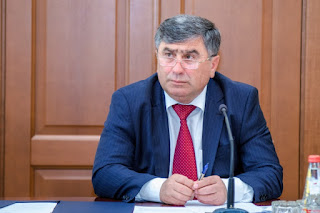
Resignation of Karachaevo-Cherkessia’s Government Signals Rising Ethnic Tensions in Republic
By Valery Dzutsev
In August, the prime minister of Karachaevo-Cherkessia, Murad Kardanov, unexpectedly resigned after three years in office. The governor of the republic, Rashid Temrezov, proposed Ruslan Kazanokov’s candidacy for the prime minister’s position (Rossiyskaya Gazeta, August 27). The change in government came soon after the Circassians of Karachaevo-Cherkessia, also known as the Cherkess, rallied against the republican authorities. The Cherkess demanded the resumption of the work of the so-called Extraordinary Conference of the Cherkess People. One of the primary demands of the conference is for the Cherkess to secede from Karachaevo-Cherkessia to form their own republic (Natpressru.info, July 10).
Karachaevo-Cherkessia is a small, but highly diverse republic in the Northwestern Caucasus. The Turkic-speaking Karachays make up the plurality in the republic (about 42 percent), but the other titular ethnicity, the Cherkess (about 12 percent of the republican population), regularly contest the Karachays’ dominance.
Both, the previous and the current prime ministers of Karachaevo-Cherkessia are ethnic Cherkess. The governor of the republic, Temrezov, who is a Karachay, has apparently tried to appease the Cherkess people by replacing one Cherkess with another. Kazanokov used to be the prime minister of Karachaevo-Cherkessia under republican president Mustafa Batdyev (2003–2004), and is considered to be close to the influential Cherkess Derevs clan. Hence, the appointment of Kazanokov appears to be a signal of “peace” to the Derevs family, whose members are now likely to reconsider their decision to fuel discontent among the Cherkess of the republic (Kavkazskaya Politika, September 2).
However, another influential and disgruntled Cherkess leader, former head of Khabez district Rauf Arashukov, is unhappy about Kazanokov’s appointment and the deal that Temrezov may have reached with the Derevs clan. Moreover, Arashukov declared that the authorities could not “buy” his support by offering him another government position. Some analysts suggested that Arashukov could be offered the position of the head of the tax collection agency of Karachaevo-Cherkessia. Arashukov claimed he was not going to amend his principles and “betray his people for the sake of career or personal wealth” (Kavkazskaya Politika, September 3).
If Temrezov were to satisfy both the Derevs, by appointing their man as the prime minister, and Arashukov, by appointing him as the head of the tax collection agency, then the Karachays could be the next to revolt; together, these two positions are considered too important to be centralized under a single faction. As Temrezov paves the way for his reappointment as the governor of the republic next year, the challenges before him appear to be quite formidable, and more political tensions are likely to surface.




